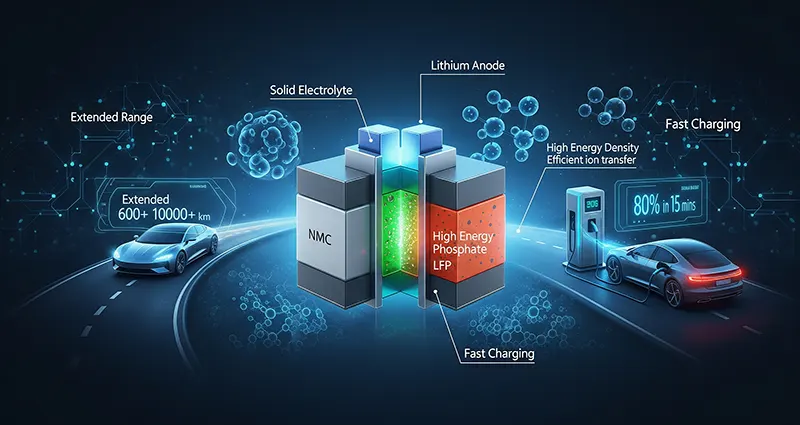The electric vehicle (EV) industry is continuously evolving, with battery technology playing a critical role in shaping the future of transportation. One of the most promising advancements is the development of solid-state batteries, which aim to overcome the limitations of current lithium-ion batteries. Solid-state battery development is set to revolutionize the EV market by offering extended driving ranges and significantly faster charging times, addressing two major consumer concerns.
What Are Solid-State Batteries?
Unlike conventional lithium-ion batteries that use a liquid electrolyte to transport ions between the battery’s electrodes, solid-state batteries utilize a solid electrolyte. This fundamental difference can lead to enhanced safety, higher energy density, and improved thermal stability.
Key Benefits Driving Solid-State Battery Development
1. Extended EV Range
One of the most significant advantages of solid-state batteries is their potential to drastically increase energy density. Higher energy density means more energy can be stored in the same physical space, allowing EVs to travel longer distances on a single charge. Estimates suggest solid-state batteries could offer 2 to 3 times the energy density of existing lithium-ion cells, potentially pushing EV ranges well beyond 400 miles per charge.
2. Faster Charging Times
Charging speed is a crucial factor for EV adoption. Solid electrolytes enable faster ion transport, reducing charging duration substantially compared to traditional batteries. This could mean recharging an EV in a matter of minutes rather than hours, making electric cars more convenient and comparable to the refueling times of internal combustion vehicles.
3. Enhanced Safety
Solid-state batteries eliminate the flammable liquid electrolytes found in standard lithium-ion batteries, significantly reducing the risk of fires and thermal runaway. This improvement enhances overall vehicle safety, providing peace of mind for consumers and manufacturers alike.
4. Longer Battery Lifespan
Solid-state technology is more resistant to degradation over time, increasing the battery’s lifecycle and maintaining its capacity for a longer period. This translates to longer-lasting batteries and reduced replacement costs, improving the total cost of ownership for EV users.
Challenges in Solid-State Battery Development
Despite its promising advantages, solid-state battery technology faces several hurdles before widespread commercialization:
- Manufacturing Complexity: Solid electrolytes require precise manufacturing processes and new production infrastructure, which currently increase costs.
- Material Durability: Finding solid electrolytes that maintain performance through thousands of charge cycles remains a challenge.
- Scalability: Scaling lab prototypes to mass production that meets automotive standards is still in progress.
Leading Companies and Research Efforts
Many automotive and technology companies are investing heavily in solid-state battery development, including:
- Toyota: One of the pioneers in solid-state battery research, aiming to commercialize batteries with increased range and rapid charging in the coming years.
- QuantumScape: A high-profile startup focused solely on solid-state tech, securing partnerships with major automakers.
- Samsung SDI, Panasonic, and Solid Power: Other key players innovating in materials and manufacturing processes to bring solid-state batteries closer to reality.
Solid-state battery development represents a major leap forward for the electric vehicle industry, promising extended driving range, faster charging, improved safety, and longer battery life. While challenges remain, continued research and investment are accelerating progress toward commercial adoption. As this technology matures, it will play a vital role in making EVs more practical, affordable, and appealing to the mass market, ultimately driving the global transition to sustainable transportation.





